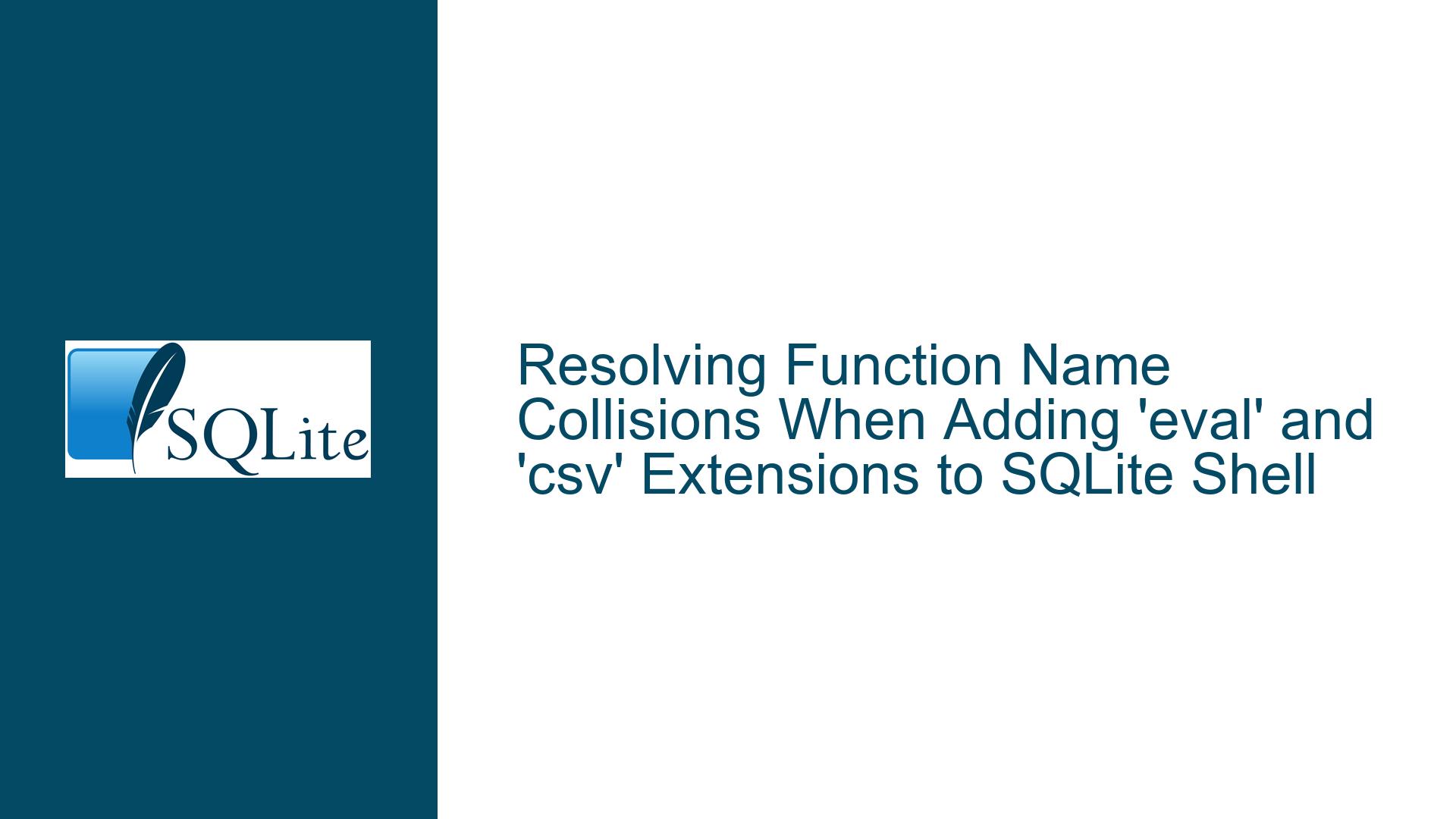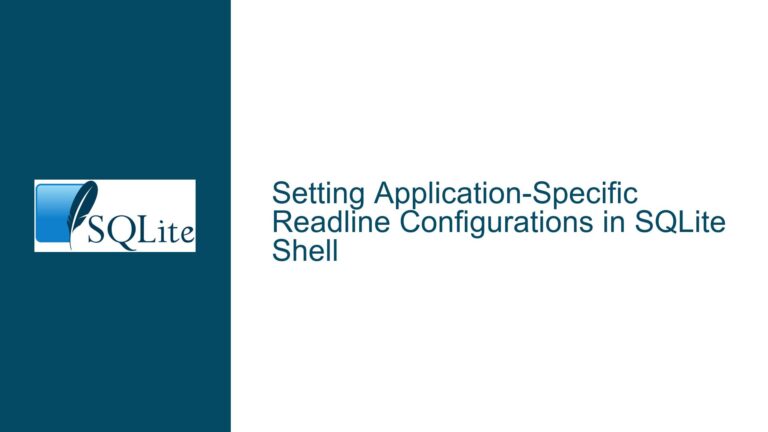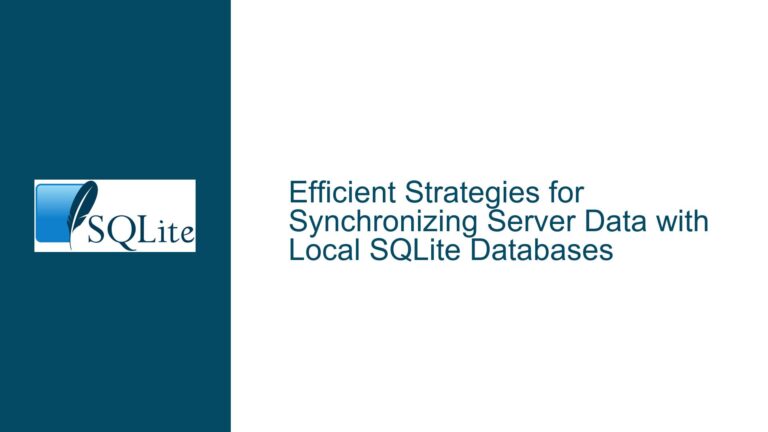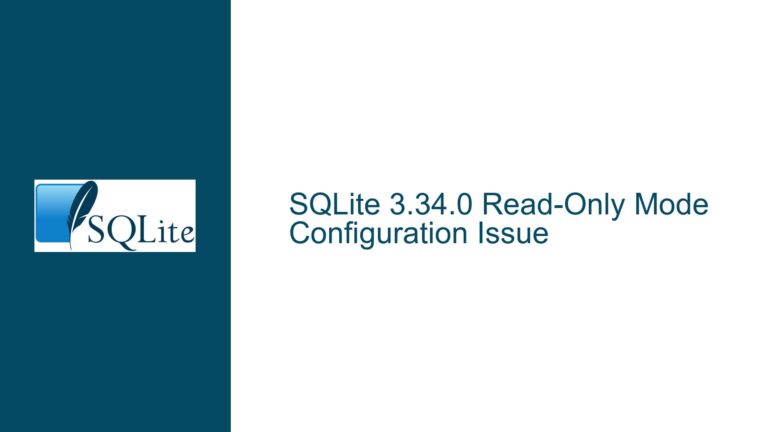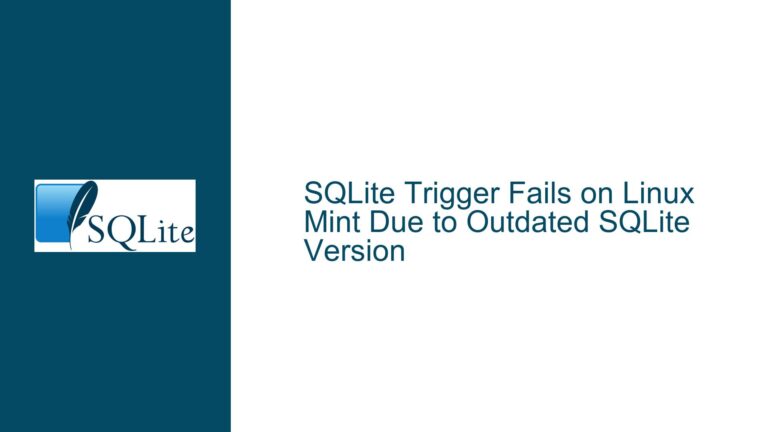Resolving Function Name Collisions When Adding ‘eval’ and ‘csv’ Extensions to SQLite Shell
Function Name Collisions in SQLite Shell Extensions
When attempting to add the ‘eval’ and ‘csv’ extensions to the SQLite shell, users encounter function name collisions that prevent successful integration. Specifically, the ‘callback’ function in the ‘eval’ extension conflicts with a pre-existing function of the same name in the shell.c code. Similarly, the ‘csv_read_one_field’ function in the ‘csv’ extension clashes with a function already defined in the shell.c code. These collisions occur because the SQLite shell, being a diagnostic tool, shares some function names with the extensions, leading to compilation errors.
The issue is exacerbated by the fact that the SQLite shell is not just a simple interface to the SQLite core but also includes its own set of utilities and functions. This overlap in function names between the shell and the extensions creates a barrier to seamlessly integrating these extensions into the shell. The problem is not unique to the ‘eval’ and ‘csv’ extensions; it is a recurring issue when adding any extension to the SQLite shell that shares function names with the shell’s internal code.
The core of the problem lies in the design of the SQLite shell, which was not initially intended to be a modular system for loading extensions. Instead, it was designed as a standalone tool with a fixed set of functionalities. As the SQLite ecosystem has grown, the demand for extending the shell’s capabilities has increased, leading to these naming conflicts. The issue is further complicated by the fact that the SQLite shell is often used as a testing ground for new extensions, which are later integrated into the core SQLite library. This dual role of the shell as both a diagnostic tool and a development platform creates a tension between maintaining a stable, consistent interface and allowing for extensibility.
Interrupted Write Operations Leading to Index Corruption
The primary cause of the function name collisions is the lack of namespace isolation between the SQLite shell and the extensions. In the case of the ‘eval’ extension, the ‘callback’ function is a common utility function that is used both within the shell and the extension. When the extension is added to the shell, the compiler encounters two definitions of the same function, leading to a collision. Similarly, the ‘csv_read_one_field’ function in the ‘csv’ extension conflicts with a function of the same name in the shell.c code.
Another contributing factor is the way extensions are integrated into the SQLite shell. Unlike the core SQLite library, which is designed to be modular and extensible, the shell is a monolithic application with a fixed set of functionalities. When extensions are added to the shell, they are essentially merged into the shell’s codebase, leading to potential conflicts with existing functions. This is particularly problematic for extensions that provide functionalities similar to those already present in the shell, as they are more likely to share function names.
The issue is further compounded by the fact that the SQLite shell is often used as a testing ground for new extensions. Developers may create extensions with function names that are already in use within the shell, leading to collisions when the extensions are later integrated into the shell. This is especially true for utility functions, which are often named in a generic manner (e.g., ‘callback’, ‘read_one_field’) and are therefore more likely to conflict with existing functions.
Implementing Namespace Isolation and Modular Extension Loading
To resolve the function name collisions when adding the ‘eval’ and ‘csv’ extensions to the SQLite shell, several steps can be taken. The first and most straightforward solution is to rename the conflicting functions in the extensions. For example, the ‘callback’ function in the ‘eval’ extension can be renamed to ‘evcallback’, and the ‘csv_read_one_field’ function in the ‘csv’ extension can be renamed to ‘csvx_read_one_field’. This approach has already been proven effective in the forum discussion, where renaming the functions allowed the extensions to be successfully integrated into the shell.
However, renaming functions is a temporary fix and does not address the underlying issue of namespace isolation. A more robust solution would be to implement namespace isolation between the SQLite shell and the extensions. This could be achieved by prefixing all functions in the extensions with a unique identifier, such as the name of the extension. For example, the ‘callback’ function in the ‘eval’ extension could be renamed to ‘eval_callback’, and the ‘csv_read_one_field’ function in the ‘csv’ extension could be renamed to ‘csv_read_one_field’. This would prevent future collisions and make it clear which functions belong to which extensions.
Another approach is to modularize the SQLite shell so that extensions can be loaded dynamically without being merged into the shell’s codebase. This would involve creating a separate module for each extension and using a plugin architecture to load the extensions at runtime. The shell would then call the extension functions through a well-defined interface, avoiding the need to merge the extension code into the shell’s codebase. This approach would not only prevent function name collisions but also make it easier to add, remove, and update extensions without modifying the shell’s code.
A third approach is to create a separate compilation unit for the extensions, similar to the ‘gob_of_extensions.c’ file suggested in the forum discussion. This file would include all the necessary extensions and could be compiled separately from the shell. The shell would then link against this file to access the extension functions. This approach would allow for better control over which extensions are included in the shell and would prevent function name collisions by isolating the extension code from the shell code.
In addition to these technical solutions, it is also important to establish best practices for developing and integrating extensions into the SQLite shell. Developers should be encouraged to use unique function names and to prefix their functions with the name of the extension. They should also be encouraged to test their extensions in a modular environment before integrating them into the shell. This would help to identify and resolve naming conflicts early in the development process.
Finally, the SQLite development team should consider creating a formal extension API for the shell. This API would define a standard interface for loading and interacting with extensions, making it easier for developers to create and integrate extensions without running into naming conflicts. The API could also include mechanisms for namespace isolation, such as function name prefixes or dynamic loading, to prevent future collisions.
In conclusion, the function name collisions when adding the ‘eval’ and ‘csv’ extensions to the SQLite shell are a result of the lack of namespace isolation and the monolithic design of the shell. By renaming conflicting functions, implementing namespace isolation, modularizing the shell, and establishing best practices for extension development, these collisions can be resolved, and the shell can be made more extensible and maintainable.
